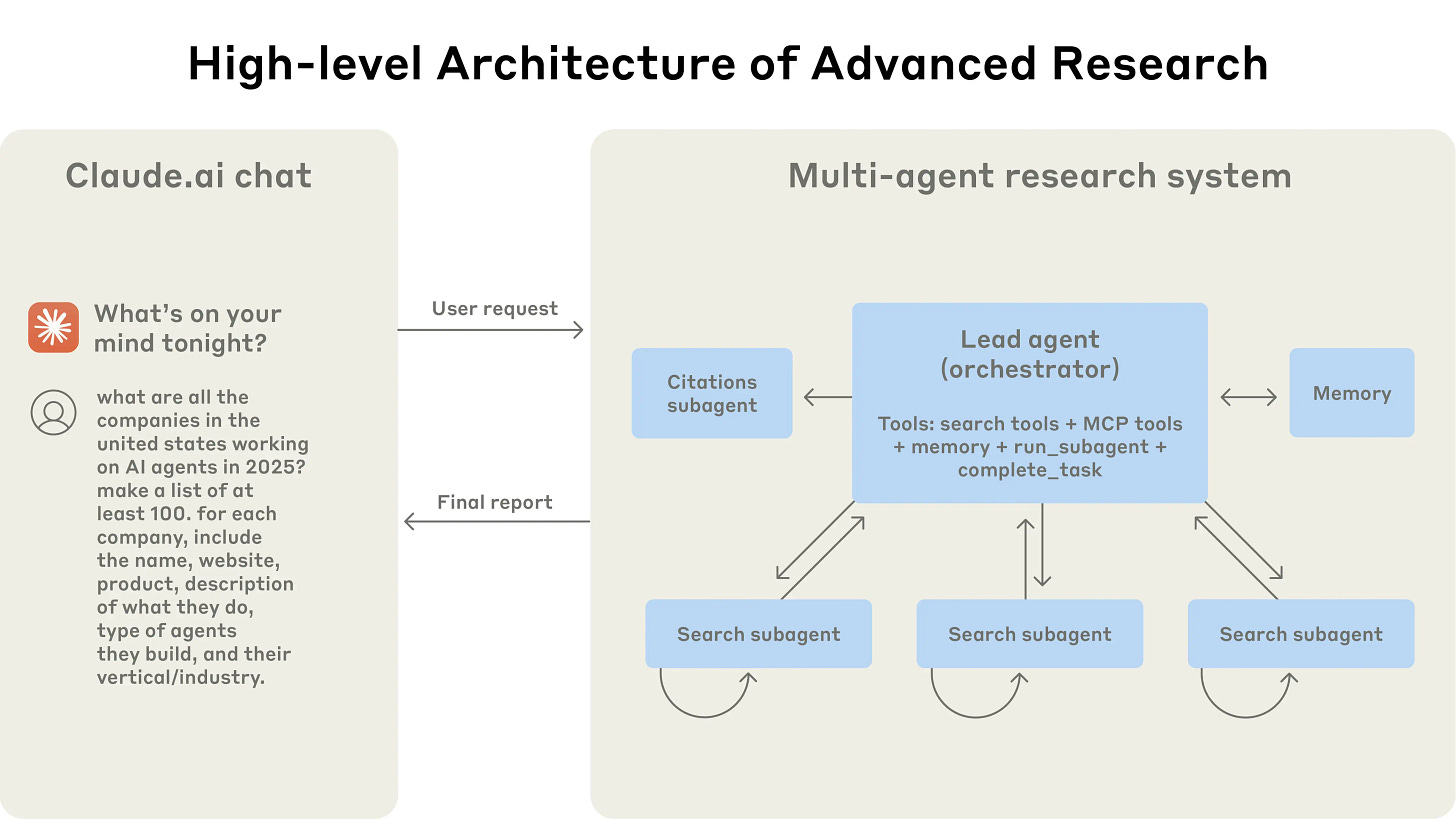Claude-Powered Parallel Agents🤖
Claude launches parallel AI agents for advanced research, Toyota unveils Woven City robot town, and NY passes RAISE Act mandating safety for large-scale AI developers.
In a week brimming with bold leaps in AI and urban innovation, three transformative developments are setting the stage for the future.
Anthropic’s Claude Multi-Agent Parallel Research System is redefining how we tackle complex research tasks—using a lead AI to coordinate a swarm of specialized subagents, each exploring a different path in parallel. This dynamic architecture delivers deeper insights faster, showcasing the power of prompt engineering, delegation, and adaptive reasoning in real time.
Meanwhile, on the other side of the world, Toyota is bringing science fiction to life with the upcoming launch of Woven City, the planet’s first robot-powered urban ecosystem. Set at the foot of Mount Fuji and designed as a “living laboratory,” this hydrogen-powered smart city will integrate autonomous mobility, sensor-driven infrastructure, and AI-enhanced daily life—all in a bid to co-create the future of sustainable urban living.
And back in the U.S., lawmakers are stepping up to meet AI’s challenges with accountability. New York’s Senate just passed the groundbreaking RAISE Act, spearheaded by Senator Andrew Gounardes. Targeted at the largest AI developers, this legislation mandates safety protocols, risk audits, and incident reporting for advanced models—marking a historic move toward AI transparency and public protection.
From multi-agent intelligence to robot cities and regulatory foresight, June 2025 reminds us: the future isn’t waiting. It's being built—right now.
Claude Multi-Agent Parallel Research System Overview
The multi-agent research system uses multiple Claude agents working in parallel to tackle complex research tasks more effectively than single-agent approaches. When a user submits a query, a lead agent analyzes it, creates a plan, and spawns specialized subagents to explore different aspects simultaneously; these subagents independently gather information and return their findings for synthesis by the lead agent, which iteratively refines the research until a comprehensive answer is achieved. This architecture excels at tasks that require exploring multiple independent directions, as it enables dynamic adaptation and parallel reasoning, but it also consumes significantly more tokens and is best suited for high-value, highly parallelizable research domains rather than tasks with heavy interdependencies, such as most coding projects. The system’s effectiveness depends on prompt engineering, clear delegation, and adaptive evaluation methods, with lessons learned including the importance of guiding agent thinking, scaling effort to query complexity, and using LLMs as flexible evaluators to judge research quality based on outcomes rather than rigid process adherence.
Toyota to Launch World’s First Robot City
Toyota is set to launch Woven City, the world’s first “robot city,” at the base of Mount Fuji in Japan in fall 2025. Built on the former Higashi-Fuji plant site in Shizuoka Prefecture, this 175-acre experimental metropolis will serve as a real-world testbed for advanced mobility, smart infrastructure, robotics, and sustainable living. Initially, about 100 residents—mainly Toyota engineers and their families—will live there, with plans to expand to 2,000 over time. Woven City features autonomous electric vehicles, smart homes powered by hydrogen fuel cells and solar panels, and a fully connected urban environment where every building, street, and service is integrated through sensors and AI. Designed as a “living laboratory,” the city enables inventors and residents to co-create and test new technologies in daily life, with the long-term goal of establishing a scalable model for future smart cities worldwide123456.
NY Senate Passes RAISE Act for AI Safety and Accountability
New York State Senator Andrew Gounardes’ RAISE Act, which passed the State Senate on June 12, 2025, is a landmark bill requiring the largest AI developers—those spending over $100 million on advanced AI models—to implement safety plans aimed at preventing widespread harm, such as automated crime or the creation of bioweapons. The Act mandates these companies to publish safety and security protocols, conduct risk evaluations for severe threats that could cause over $1 billion in damage or result in hundreds of deaths or injuries, and disclose serious incidents like dangerous AI behavior or model theft. The RAISE Act empowers the New York State Attorney General to enforce these standards with civil penalties and is designed to set America’s first legally mandated transparency requirements for frontier AI labs, ensuring that innovation can continue while prioritizing public safety and preventing companies from cutting corners. This targeted, forward-looking legislation responds to urgent warnings from AI experts and aims to keep New York ahead of emerging technology risks without stifling innovation.
Hand Picked Vide
In this video, we'll look at building a thinking social media agent powered by Claude 3.7 Sonnet that can understand your voice, craft thoughtful posts, and engage authentically with your audience—all while saving you hours of content creation time.
Top AI Products from this week
LLM SEO Report - LLM SEO Report lets you check what ChatGPT, Google Gemini or Claude think about your brand or a competitor. LLM SEO Report is a simple way to better understand how ChatGPT, Google Gemini and Claude think about various brands based on their llm training data.
VibeSec - VibeSec is your AI-powered code security copilot. Instantly scan your GitHub repos, catch vulnerabilities, and get smart reports before bad code becomes bad press. Built for vibe coders, solo devs, and fast-moving teams.
The New Microsoft Copilot - Meet the new Microsoft Copilot, your AI companion that remembers details (Memory), takes action (Actions), sees your world (Vision), and more. More personal & useful.
HiDevs - Whether you’re in tech, sales, HR, or product—upskill, build and learn with personalised roadmaps, AI agents, industry-level projects, real-time feedback.
Augmentoolkit 3.0 - Augmentoolkit lets anyone make data and train custom AI to understand new facts or do new tasks. Usage is: add files, click button. By training custom LLMs you extend their knowledge cutoff. Combos with RAG. Can generate data for free on consumer hardware.
ZenCtrl - ZenCtrl is a framework to Generate multi-view, diverse-scene, and task-specific high-resolution images from a single subject image—without fine-tuning. Just drop your product image and start generating images
This week in AI
AMD, OpenAI Launch Helios - AMD, OpenAI to debut Helios AI server in 2026 with 72 MI400 chips, rivaling Nvidia NVL72. Open standards, annual chip updates, and major cloud partners onboard.
LRMs Reasoning Limits Exposed - Study finds Large Reasoning Models fail at complex tasks, show inconsistent reasoning, and can’t use explicit algorithms, revealing key strengths and weaknesses.
China Unveils Zuchongzhi 3.0 Quantum Chip - China’s Zuchongzhi 3.0 quantum processor, with 105 qubits, runs 1 quadrillion times faster than top supercomputers, rivaling Google’s Willow chip.
Reddit Sues Anthropic Over Data Scraping - Reddit sues Anthropic for allegedly scraping over 100,000 times to train Claude AI, violating terms and user privacy; seeks damages and an injunction.
UK Sees Surge in AI Cheating Cases - Nearly 7,000 UK university students were caught cheating with AI tools like ChatGPT in 2023-24, up from 1.6 to 5.1 cases per 1,000 students; experts warn many go undetected.




